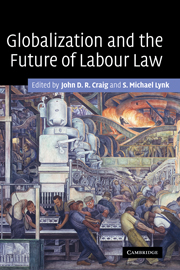Book contents
- Frontmatter
- Contents
- Notes on contributors
- Acknowledgements
- Table of cases
- List of abbreviations
- Introduction
- PART I Perspectives on globalization
- PART II International labour standards
- 3 The impact of globalization on labour standards
- 4 Globalization, decentralization and the role of subsidiarity in the labour setting
- 5 A game-theory account and defence of transnational labour standards – a preliminary look at the problem
- PART III The European Union
- PART IV The Americas
- PART V The ILO
- PART VI Labour rights
- Bibliography
- Index
5 - A game-theory account and defence of transnational labour standards – a preliminary look at the problem
Published online by Cambridge University Press: 23 July 2009
- Frontmatter
- Contents
- Notes on contributors
- Acknowledgements
- Table of cases
- List of abbreviations
- Introduction
- PART I Perspectives on globalization
- PART II International labour standards
- 3 The impact of globalization on labour standards
- 4 Globalization, decentralization and the role of subsidiarity in the labour setting
- 5 A game-theory account and defence of transnational labour standards – a preliminary look at the problem
- PART III The European Union
- PART IV The Americas
- PART V The ILO
- PART VI Labour rights
- Bibliography
- Index
Summary
Introduction
Information and communications technologies have not only annihilated space and time to create a global labour market, they have also simultaneously helped publicize the appalling labour standards in many developing countries, including, though by no means limited to, their sectors producing goods for export to the developed world. Suddenly, the world of transnational labour standards, long the private preserve of specialists at organizations like the International Labour Organization (ILO), has come under increased scrutiny from demonstrators in the streets outside trade negotiations to American presidential debates, which have lately included intense, if confusing, discussions about labour standards in trade agreements.
The scholarly literature on transnational labour standards is still some way from shaping these intense political controversies. To be blunt, it is remarkable how little is known in an academic sense about transnational labour standards. We know very little about when such standards will be promulgated and less still about their systematic effects. In this near-vacuum, it is hard to argue effectively for the rejection of any of the common political positions, such as either the naive proliferation of labour standards (four hundred conventions of the International Labour Organization, on this way of thinking, being self-evidently twice as good as two hundred) or their total rejection as impediments to trade or development.
The most significant gap in the literature is the lack of systematic knowledge about the real-world impact of existing labour standards. Our ignorance here is close to total.
- Type
- Chapter
- Information
- Globalization and the Future of Labour Law , pp. 143 - 166Publisher: Cambridge University PressPrint publication year: 2006



